Europe
For these young soldiers, Ukraine has been at war for half their lives
The Washington Post August 1, 2023
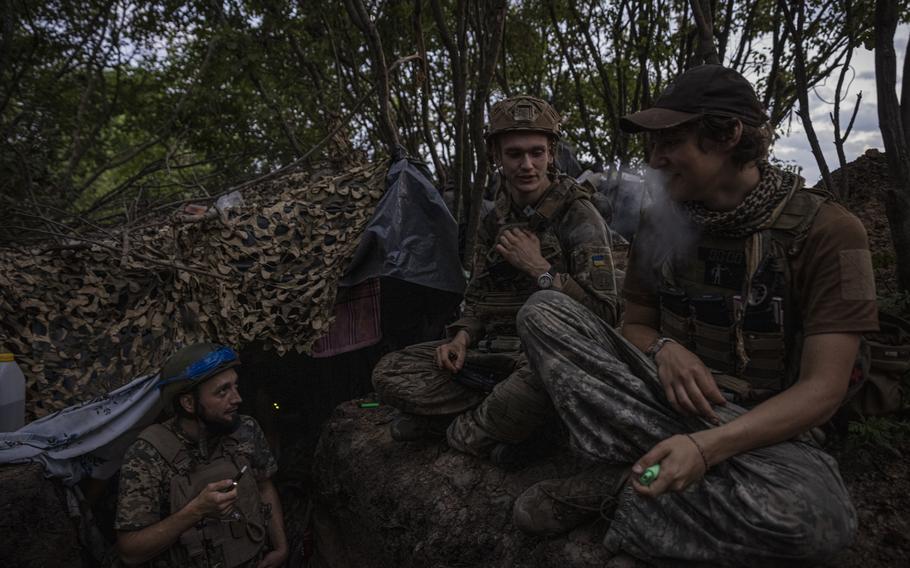
Soldiers with the call sign Witcher, 19, center, Labrador, left, and Miami, right, from Ukraine’s 78th Assault Regiment chat about using humor to deal with war after arriving at a trench, forward from the village of Mala Tokmachka before dawn on July 7 in Zaporizhzhia, Ukraine. (Ed Ram/for The Washington Post)
MALA TOKMACHKA, Ukraine — The young drone squad barged into the base camp near here, boots thumping across the floor where other Ukrainian soldiers slept, as smartphones sounded a 3 a.m. wake-up call.
"Good morning, Vietnam!" one shouted, as the recon team, several of them still teenagers, rousted others. They talked and joked as they collected electronic gear and ammo from their makeshift headquarters, a community center in Ukraine's southern Zaporizhzhia region. One wore cowboy boots and a bush hat.
In the moonlight outside, the soldiers loaded weapons, Mavic drones, and other supplies into a camouflaged pickup truck, then sped off through the ruins of several Ukrainian villages toward the front.
For the young drone pilots of 78th Regiment, it was the start of another day in a trench, glued like gamers to the video screens of their drone controllers and staring across a no man's land at heavily fortified Russian positions as artillery thumped and whistled around them.
Their job was to hunt enemy targets with drones in a war that, for some of them, has been going on for more than half their lives. They are part of a generation of Ukrainians that has virtually no memory of peacetime. Now, they wrestle daily with split-second decisions that could mean life or death for themselves or the enemy soldiers they target.
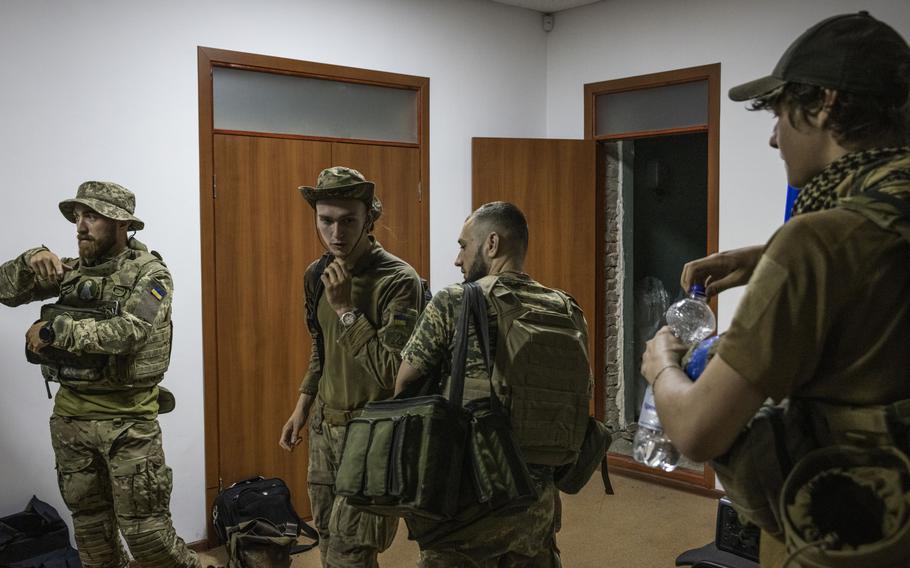
Soldiers with the call signs Labrador, left, Witcher, 19, center left, Chuck, center right, and Miami get ready on a base in Zaporizhzhia, Ukraine, to go to the front line before dawn in July. The Washington Post spent the night and morning with a unit from Ukraine’s 78th Assault Regiment using Kamikaze and surveillance drones on the Zaporizhzhia front line. (Ed Ram/for The Washington Post)
Vadym, 19, the fast-talking, wisecracking merry warrior of the bunch, is typical. He was 10 when Moscow invaded Crimea and stoked war in eastern Ukraine in 2014. When Russian President Vladimir Putin ordered a massive invasion in February 2022, Vadym had just turned 18 — draft age.
"And I'm like, 'What the …?' " said Vadym, a drone operator who started learning English, and a fair amount of F-bombing, while watching "Pulp Fiction." "I don't know how it is to live in a peaceful country."
In a country where almost everyone has been mobilized, it is not unusual to see graying men with potbellies working checkpoints. But this war, like so many others, has fallen mostly on the young.
Viktor Mykola Havryliyk, 28, who came of age during the pro-European demonstrations on Maidan Square in 2012-13, said he and other veteran fighters often discuss how years of war with Russia has defined the youngest fighters.
"They have this youthful power, a burning need to do something," said Mykola, a combat medic from a different unit who goes by the call sign "VK." "They sometimes do irrational things."
Mykola said it is not uncommon to see the youngest soldiers, eager to prove themselves, volunteer for combat assignments older soldiers would never take.
There were 382,989 18-year-olds in Ukraine as of Jan. 1, 2022, according to Eurostat data. Of those, 196,678 were men, many of whom were sent to fight. Men ages 18 to 60 are forbidden to leave the country.
For most of the youngest soldiers, the war with Russia in the eastern Donbas region seemed far away when they were growing up — a kind of simmering background music that occasionally touched relatives or friends. Now, however, they are on the front, fighting a powerful enemy that can, and does, strike anywhere.
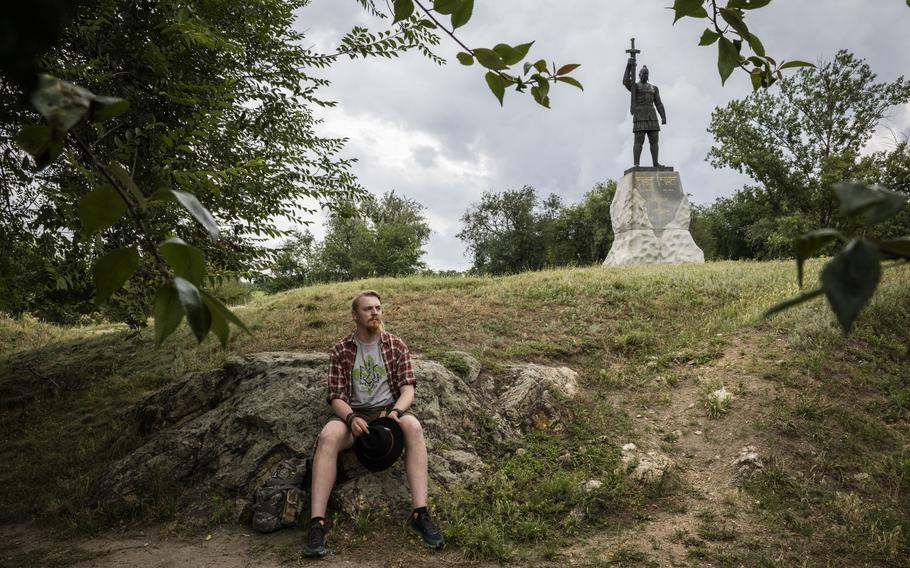
Soldier Viktor Mykola Havryliyk, 28, sits for a portrait in front of a statue of Sviatoslav the Brave, the Grand Prince of Kyiv, in a park in central Zaporizhzhia, Ukraine. (Ed Ram/for The Washington Post)
If anything, Vadym and other young soldiers voice regret that they joined the battle late. There is even a song making the rounds called, "Forgive Me, Men, Because I Wasn't in the ATO," an acronym for "anti-terrorist operation," as Kyiv called the armed conflict in the breakaway areas of Donetsk and Luhansk.
At times, they seem to relish the irony, or absurdity, of being in a war that feels like a throwback to a World War I with its trenches and artillery duels, yet employs the latest in high-tech warfare and satellite communications. In peacetime, Vadym said, he fooled around with drones as toys.
"Now we are using it just like eyes of the war, etc.," Vadym said.
Amid discussions of geographical coordinates and targets, the recon team shared war stories of their own, often from the bloody siege of Bakhmut, and some borrowed from Hollywood, particularly Vietnam-era classics such as "Apocalypse Now." They invoke video games or Netflix TV series such as "Witcher" when talking about how to choose call signs or framing their experience.
As drone pilots, their mission has a cinematic aspect. They spent hours staring at video screens, using live-streamed footage to direct artillery fire and viewing the results in real time as shells strike enemy targets. Drone footage at times is made into miniature movies that each side posts on Telegram, often with soundtracks, in a form of propaganda.
"What music would you play for this war?" Vadym asked.
Before the war, he directed music videos. Now, his soundtrack is a "war playlist," as he calls it, that's stored on the digital tablet he also uses to target Russians. The tunes would also be familiar to anyone familiar with the Woodstock era: "Turn! Turn! Turn!" by the Byrds; "Fortunate Son," by Creedence Clearwater; "Are You Experienced" by Jimi Hendrix and other '60s classics.
Vadym said he was aware that playing rock and roll in the trench was his way of coping with, and perhaps romanticizing, a hellish experience.
"For me, Bob Dylan works the best," Vadym said. "I just became a really big fan of Bob Dylan since the beginning of the war. I mean, a very beautiful song of his is 'Hard Rain is Gonna Fall.' It's just so metaphorically great."
Then, as artillery sounded in the background, Vadym cued the song, and Dylan's voice asked: "Oh, where have you been, my blue-eyed son?"
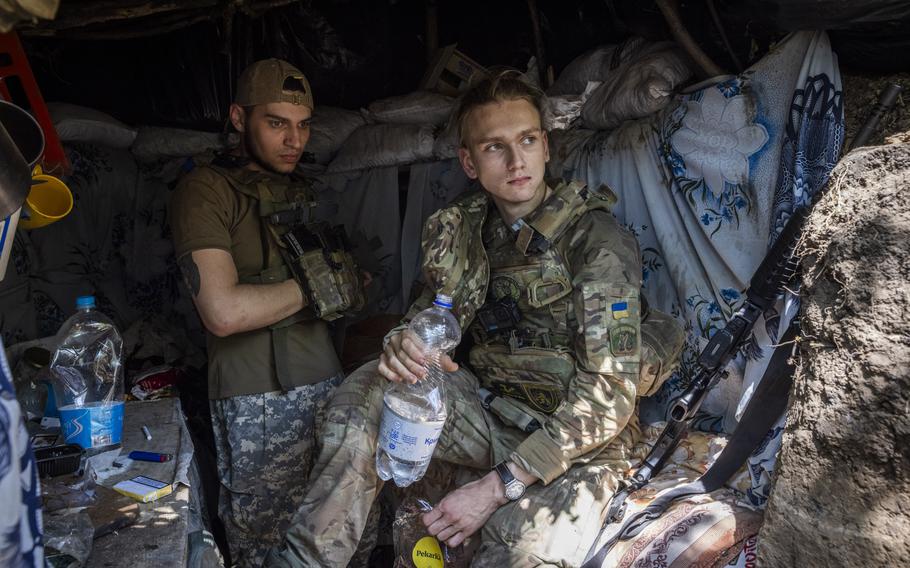
Soldiers with the call signs Witcher, 19, right, and Honey, left, from Ukraine’s 78th Assault Regiment rest after an early start in a trench position, forward from the village of Mala Tokmachka in Zaporizhzhia, Ukraine. (Ed Ram/for The Washington Post)
"War has changed all of us. It changed our perspective on how we see the world," said Oksana Rubaniak, 20, who grew up in a Carpathian mountain village. Rubaniak was an excellent student who threw herself into Ukrainian history, including Kyivan Rus, the first great Slavic empire, and thought she might become a teacher.
When armed conflict broke out in 2014, Rubaniak had only a vague sense of the gravity of the situation, often through little signs, such as the way an uncle said goodbye to her grandmother before going to Donbas.
Her uncle was taken captive in Iloviask, during one of the bloodiest battles of the early fighting — but no one in the family knew for a month. Rubaniak was 11 at the time.
When Russia invaded last year, Rubaniak helped evacuate people from Kyiv, joined a territorial defense unit and eventually became a machine-gunner who first saw combat near Bakhmut.
She was recently injured, taking shrapnel to the head, shoulder and neck in fighting near Vuhledar, but plans to rejoin the fight now that she has recovered.
For Kyril Kharkovsky, 19, war turned his family into evacuees and has elevated him to a position of responsibility faster than he ever imagined. Kharkovsky commands a platoon, a promotion that came only months after he started fighting.
Kharkovsky, a shy, soft-spoken soldier who wears his cap pulled so low it's hard to see his eyes when he talks, grew up in Ivanivka, a village east of the southern city of Kherson. His mother had a vegetable stall in the market, and his older sister worked in seaside restaurants. His father left when he was young.
Besides classes in an agricultural school, Kharkovsky's life revolved around fishing, volleyball and walks in the country. The future he expected was also down to earth, focused on family and get-togethers with friends.
Until joining the military, he had never fired a gun, and the only warfare he had seen was "Counter-Strike," a popular tactical combat video game in Ukraine. He, too, was a kid when he first saw the Maidan protests on TV, with scenes of riot police opening fire on pro-democracy demonstrators.
"All these protests, the fighting, the shooting — already at the time I thought, 'How can this be?' " Kharkovsky said. Yet, even with Russia's seizure of Crimea in early 2014 and fighting in Donbas, the idea that war would engulf his family seemed far-fetched. Then Russia invaded and occupied territory, including his hometown.
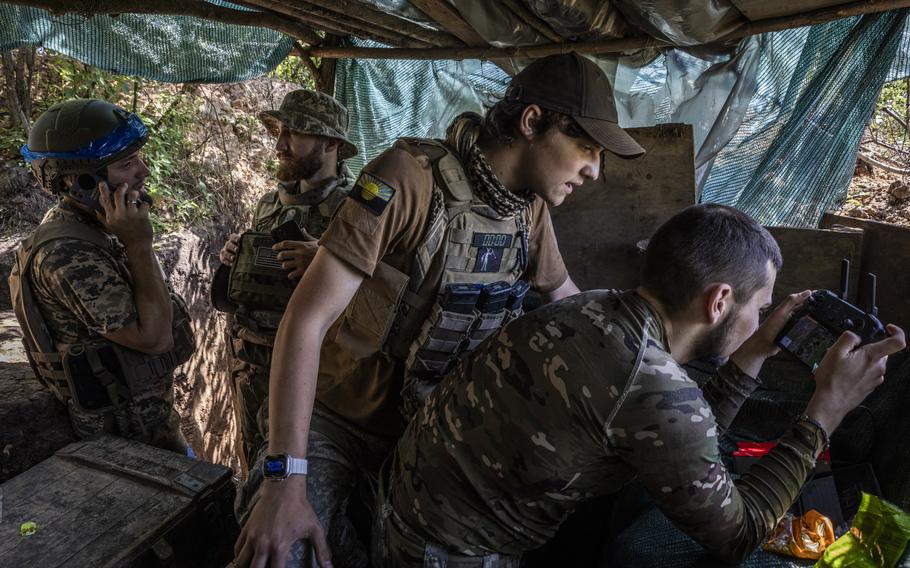
A Russian soldier digging a trench is seen in the video feed from a surveillance drone operated by a soldier with the call sign Honey, right, as a soldier with the call sign Miami, center right, looks on and Chuck, left, speaks to the unit’s commanders in a trench in a tree line belonging to Ukraine’s 78th Assault Regiment, forward from the village of Mala Tokmachka in Zaporizhzhia, Ukraine. (Ed Ram/for The Washington Post)
After three months under occupation, his family relocated to Lviv, where he enlisted. By early spring, he was in combat near Bakhmut. "It was scary," Kharkovsky said.
He carried a grenade launcher on the front lines. By late June, he was a platoon leader. That, too, was scary. "How is that I'm the youngest," he wondered, "and I have to command everyone older than me?"
Vadym, too, has been given heavy responsibilities, first in a mortar crew, then as a drone pilot.
As the sun peeped over the horizon, Vadym settled into the trench for another day of drone warfare. U.S.-provided M777 howitzers lobbed shells so high the soldiers counted 15 seconds before they hit.
"Compared to Bakhmut, it's like going to vacation, you know?" Vadym said. "No one's trying to, like, kill you every five minutes."
One soldier — who goes by the call sign Chuck and, at 32, is the elder of the group — fiddled with a video game while others prepped drones. Vadym cracked that they should be sitting on ammo boxes like in a scene in "Apocalypse Now."
"Every time I open my eyes, it seems like I'm back there in the f---ing jungles," Vadym said, riffing on the monologue by Willard, played by Martin Sheen.
They often roamed the trench without helmets, at times without flak jackets, as if impervious to the danger.
As drones took flight, live video showed a Russian soldier, stripped to the waist, digging a trench. The resolution was so sharp, they could see sweat glistening on his back as shovels of dirt flew. Should they call in artillery to kill him?
"It's a guy with a shovel and potentially a grenade launcher," said a drone pilot whose call sign is Honey, toggling joy sticks for a better look.
"Well, yeah," said another.
"Aha! So their soldiers are all naked!" said a soldier, call sign Labrador.
To the young Ukrainians, it seemed absurd that the Russian was above ground, shirtless, exposed to attack.
Eventually, the team decided that a single Russian soldier wasn't worth an artillery round. They rigged a self-detonating drone to kill him. But the drone went missing.
Anastacia Galouchka and Kostiantyn Khudov in Kyiv, Ukraine, and Cate Brown in Washington, contributed to this report